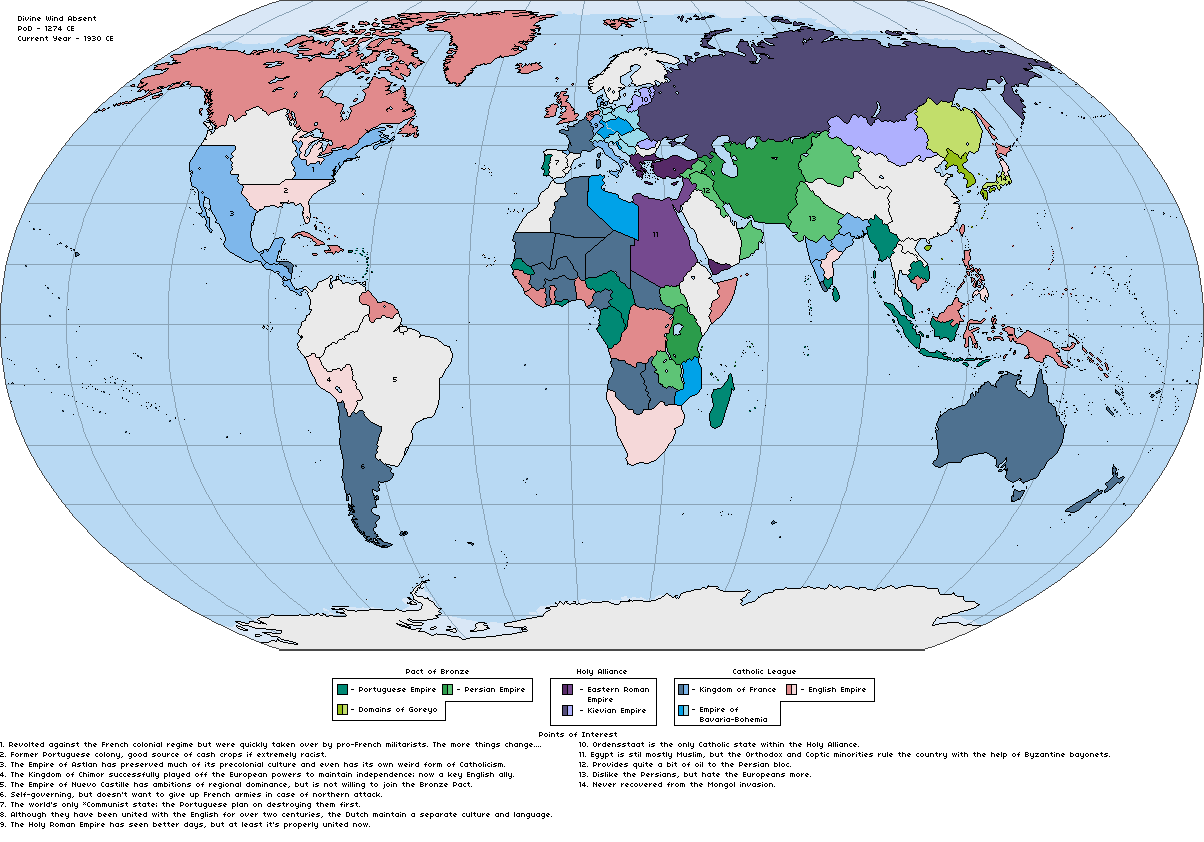HOME | DD
 RvBOMally — Divine Wind Absent
RvBOMally — Divine Wind Absent

Published: 2012-12-25 07:04:18 +0000 UTC; Views: 9073; Favourites: 50; Downloads: 96
Redirect to original
Description
Excerpt from History of the Cipangu ArchipelagoThe Cipangu archipelago was changed forever with the Mongol invasion of 1274. This invasion remains one of the most devastating in history. The Mongol invaders, furious at heavy Japanese resistance in their first landing on Kyushu, razed the island before moving onto Honshu and Shikoku. Resistance remained somewhat powerful in the mountain regions of Cipangu, where Mongol horses could do little good, but these same mountains prevented the Cipangese rebels from having much arable land. Although the Mongols were unable to take complete control of the archipelago, the establishment of a competing government in the west plunged the archipelago into nearly a century of turmoil.
The invasion also marked the end Japanese isolation from mainland Asia and the beginning of vibrant trade with Goryeo. Goryean soldiers composed most of the Mongol invasion force and provided the main portion of the fleet. The Goryeo king ruled over the western Cipangese government as a vassal an many Goryean settlers moved into the area, much to the anger of the government in Tohoku. Goryeo, itself a vassal of Sina, also opened Cipangu to many Sinese. This marks the creation of two distinct Cipangese identities that persist to this day: the cosmopolitan west and the traditional east.
Excerpt from Medieval Asia, 1000-1500
The fortunes of the Yuan Dynasty declined significantly during the end of the 14th century. Although a powerful empire that had vassals in Goreyo, Cipangu, Namviet and Mayi, the Yuan suffered from declining agricultural productivity and internal unrest. The oceanic expeditions of the early 14th century, inspired by the relative success of the invasion of Cipangu, led the Yuan to gain more tributary states and consequently overstretched their capabilities. A period of political instability caused the fall of the Yuan and the rise of a native Han dynasty.
---
This is a fairly straightforward scenario: the Mongols successfully invade Japan. Butterflies cause the Mongol invasions and occupation elsewhere to change and make the world unrecognizable to us.
By the 20th century, there is a major shift in the political status quo. While the world was once divided between the Orthodox Holy Alliance and the Catholic League, a new set of powers has arisen to challenge both. The Pact of Bronze, as it is known, is a hodgepodge of different powers with nothing in common except their desire to take the world for themselves. A paranoid, militaristic government has taken over Portugal, once England's closest ally, and wishes to destroy the leftist government in Castille. The Goryeans are a rising industrializing power, concerned that they are next on Europe's list of places to colonize. The Persians are an old power, run by a Mongol-descended dynasty, and wishes to expand its influence at the expense of the Holy Alliance. Ironically, the Holy Alliance and Catholic League are discussing creating a united front against these upstarts, agreeing that the devil they know is better than one they do not.
Related content
Comments: 14

Bavaria-Bohomia sems bit small for me to be on the same leaguel like France and Britain, especially if its ruler doesn´t hold the title of HRE.
👍: 0 ⏩: 1

It's definitely the weakest of the three. However, it is the most powerful single state in central Europe, and is quite influential there.
👍: 0 ⏩: 0

Is this is a true version of the history?
Goryeo was not a vassal state of Sina.
It was a truly independent Empire in its own right.
👍: 0 ⏩: 1

It's an alternate history scenario, so no, it's not actual history. Goryeo is this scenario's name for Korea in general, not just the historical state we know in our history.
👍: 0 ⏩: 0

I like, I like! Your use of pretty old PODs to make very different worlds is happy-making. I have a problem with Byzantium, though: with a POD seventy years after the Fourth Crusade, I am doutbtful that Byzantine decline could be reversed so forcefully.
A few questions: who originally colonized *Mexico and *Nueva Granada?
What's the big white space inside North America?
How come Manchuria is a vassal rather than part of Korea proper? (OTL the area had quite low population densities before the Chinese moved in...)
Who colonized South Africa?
Why is *Hungary Orthodox?
And how are the Chinese doing?
👍: 0 ⏩: 1

Thanks! 
- The Byzantine thing is, admittedly, a cliche. The idea here is that the Mongol Empire broke up differently and weakened the Seljuks and other would-be contenders for a powerful Muslim state in Anatolia. The Byzantines managed to get lucky.
- *Mexico was colonize by France, *Nueva Granada was colonized by *Portugal.
- It was part of China until the late 19th century, so the Chinese did have time to move in. It's a rather blatant analogue to Manchukuo.
- The Portuguese, although the Dutch and English make up a bit of the modern white population.
- That was a mistake. They should be part of the Catholic League. It's fixed now.
- Weak and being harassed by more powerful nations. Much like OTL in the late 19th/early 20th centuries. They are powerful enough to maintain north Vietnam as a tributary state, but even that's slipping away.
👍: 0 ⏩: 1

"- The Portuguese, although the Dutch and English make up a bit of the modern white population."
So - it's a Portuguese colony conquered by the Anglo-Dutch and is now a...vassal? Dominion-equivalent?
(BTW, the Portuguese "confederacy" - the same question re status in the Anglo-Dutch empire.)
Where's technology at? Late 19th century, early 20th OTL?
And is this another "Democracy? That's Greek to me" TLs?
👍: 0 ⏩: 2

They're both independent states, but close allies of the English.
Technology is WWI-esque. Biplanes and airships and all that.
The Pact of Bronze is very undemocratic, but the Catholic League states tend observe some form of limited monarchy with a democratically-elected legislature (some even have UMS). The Holy Alliance states are, in general, absolutists, the Kievians moreso than the Byzantines.
👍: 0 ⏩: 0

Oh, and you didn't answer my question about the interior of North America...
👍: 0 ⏩: 1

Whoops! It's an area that has been historically claimed by almost every colonial power but never really settled. The last Europeans to hold it, the French, used it as a dumping ground for criminals. Became part of *Mexico when it broke off, but the two American states in the East (haven't come up with names for them) helped them break off from *Mexico with a desire to conquer it later. Neither got around to doing that and now, if either one of them tried, the other would surely try to stop them.
👍: 0 ⏩: 0

It's already set to original size.
👍: 0 ⏩: 0

Somehow, there are still similarities to OTL especially with England ad France. The more things change....
👍: 0 ⏩: 1

Well, ITTL, the French are more powerful than the English rather than the other way around. But yes, they end up dominating the world and become allies in the 20th century, just like IOTL.
👍: 0 ⏩: 0

























